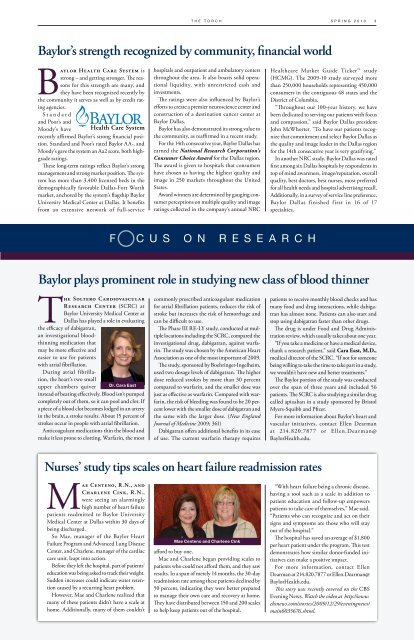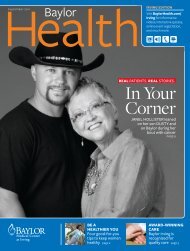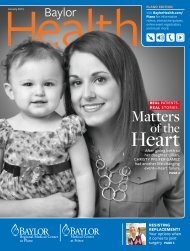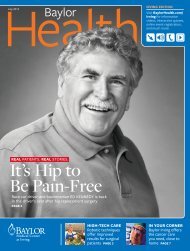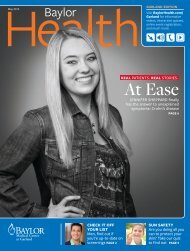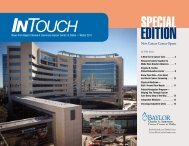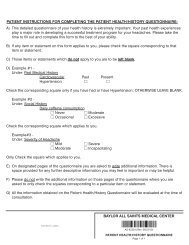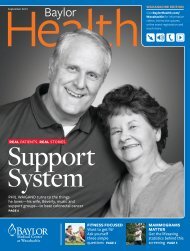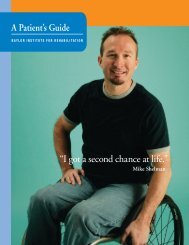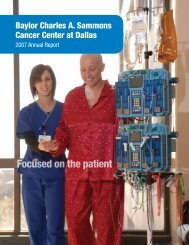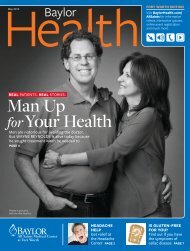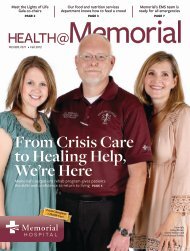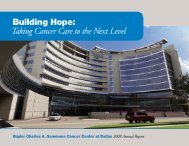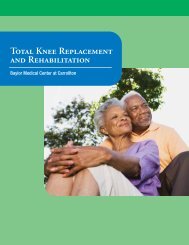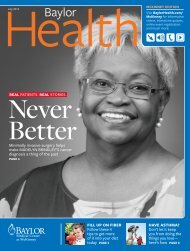B A Y L O R H E A L T H C A R E S Y S T E M F O U N D A T I O
B A Y L O R H E A L T H C A R E S Y S T E M F O U N D A T I O
B A Y L O R H E A L T H C A R E S Y S T E M F O U N D A T I O
You also want an ePaper? Increase the reach of your titles
YUMPU automatically turns print PDFs into web optimized ePapers that Google loves.
T H E T O R C H s p r i n g 2 0 1 0 3<br />
Baylor’s strength recognized by community, financial world<br />
Baylor Health Care System is<br />
strong – and getting stronger. The reasons<br />
for this strength are many, and<br />
they have been recognized recently by<br />
the community it serves as well as by credit rating<br />
agencies.<br />
S t a n d a r d<br />
and Poor’s and<br />
Moody’s have<br />
recently affirmed Baylor’s strong financial position.<br />
Standard and Poor’s rated Baylor AA-, and<br />
Moody’s gave the system an Aa2 score, both highgrade<br />
ratings.<br />
These long-term ratings reflect Baylor’s strong<br />
management and strong market position. The system<br />
has more than 3,400 licensed beds in the<br />
demographically favorable Dallas-Fort Worth<br />
market, anchored by the system’s flagship Baylor<br />
University Medical Center at Dallas. It benefits<br />
from an extensive network of full-service<br />
hospitals and outpatient and ambulatory centers<br />
throughout the area. It also boasts solid operational<br />
liquidity, with unrestricted cash and<br />
investments.<br />
The ratings were also influenced by Baylor’s<br />
efforts to create a premier neuroscience center and<br />
construction of a destination cancer center at<br />
Baylor Dallas.<br />
Baylor has also demonstrated its strong value to<br />
the community, as reaffirmed in a recent study.<br />
For the 14th consecutive year, Baylor Dallas has<br />
earned the National Research Corporation’s<br />
Consumer Choice Award for the Dallas region.<br />
The award is given to hospitals that consumers<br />
have chosen as having the highest quality and<br />
image in 250 markets throughout the United<br />
States.<br />
Award winners are determined by gauging consumer<br />
perceptions on multiple quality and image<br />
ratings collected in the company’s annual NRC<br />
Healthcare Market Guide Ticker study<br />
(HCMG). The 2009-10 study surveyed more<br />
than 250,000 households representing 450,000<br />
consumers in the contiguous 48 states and the<br />
District of Columbia.<br />
“Throughout our 100-year history, we have<br />
been dedicated to serving our patients with focus<br />
and compassion,” said Baylor Dallas president<br />
John McWhorter. “To have our patients recognize<br />
that commitment and select Baylor Dallas as<br />
the quality and image leader in the Dallas region<br />
for the 14th consecutive year is very gratifying.”<br />
In another NRC study, Baylor Dallas was rated<br />
first among six Dallas hospitals by respondents in<br />
top of mind awareness, image/reputation, overall<br />
quality, best doctors, best nurses, most preferred<br />
for all health needs and hospital advertising recall.<br />
Additionally, in a survey of service line preference,<br />
Baylor Dallas finished first in 16 of 17<br />
specialties.<br />
F<br />
C U S O N R E S E A R C H<br />
Baylor plays prominent role in studying new class of blood thinner<br />
The Soltero Cardiovascular<br />
Research Center (SCRC) at<br />
Baylor University Medical Center at<br />
Dallas has played a role in evaluating<br />
the efficacy of dabigatran,<br />
an investigational bloodthinning<br />
medication that<br />
may be more effective and<br />
easier to use for patients<br />
with atrial fibrillation.<br />
During atrial fibrillation,<br />
the heart’s two small<br />
upper chambers quiver Dr. Cara East<br />
instead of beating effectively. Blood isn’t pumped<br />
completely out of them, so it can pool and clot. If<br />
a piece of a blood clot becomes lodged in an artery<br />
in the brain, a stroke results. About 15 percent of<br />
strokes occur in people with atrial fibrillation.<br />
Anticoagulant medications thin the blood and<br />
make it less prone to clotting. Warfarin, the most<br />
commonly prescribed anticoagulant medication<br />
for atrial fibrillation patients, reduces the risk of<br />
stroke but increases the risk of hemorrhage and<br />
can be difficult to use.<br />
The Phase III RE-LY study, conducted at multiple<br />
locations including the SCRC, compared the<br />
investigational drug, dabigatran, against warfarin.<br />
The study was chosen by the American Heart<br />
Association as one of the most important of 2009.<br />
The study, sponsored by Boehringer-Ingelheim,<br />
used two dosage levels of dabigatran. The higher<br />
dose reduced strokes by more than 30 percent<br />
compared to warfarin, and the smaller dose was<br />
just as effective as warfarin. Compared with warfarin,<br />
the risk of bleeding was found to be 20 percent<br />
lower with the smaller dose of dabigatran and<br />
the same with the larger dose. (New England<br />
Journal of Medicine 2009; 361)<br />
Dabigatran offers additional benefits in its ease<br />
of use. The current warfarin therapy requires<br />
patients to receive monthly blood checks and has<br />
many food and drug interactions, while dabigatran<br />
has almost none. Patients can also start and<br />
stop using dabigatran faster than other drugs.<br />
The drug is under Food and Drug Administration<br />
review, which usually takes about one year.<br />
“If you take a medicine or have a medical device,<br />
thank a research patient,” said Cara East, M.D.,<br />
medical director of the SCRC. “If not for someone<br />
being willing to take the time to take part in a study,<br />
we wouldn’t have new and better treatments.”<br />
The Baylor portion of the study was conducted<br />
over the span of three years and included 56<br />
patients. The SCRC is also studying a similar drug<br />
called apixaban in a study sponsored by Bristol<br />
Myers-Squibb and Pfizer.<br />
For more information about Baylor’s heart and<br />
vascular initiatives, contact Ellen Dearman<br />
at 214.820.7877 or Ellen.Dearman@<br />
BaylorHealth.edu.<br />
Nurses’ study tips scales on heart failure readmission rates<br />
Mae Centeno, R.N., and<br />
Charlene Cink, R.N.,<br />
were seeing an alarmingly<br />
high number of heart failure<br />
patients readmitted to Baylor University<br />
Medical Center at Dallas within 30 days of<br />
being discharged.<br />
So Mae, manager of the Baylor Heart<br />
Failure Program and Advanced Lung Disease<br />
Center, and Charlene, manager of the cardiac<br />
care unit, leapt into action.<br />
Before they left the hospital, part of patients’<br />
education was being asked to track their weight.<br />
Sudden increases could indicate water retention<br />
caused by a recurring heart problem.<br />
However, Mae and Charlene realized that<br />
many of these patients didn’t have a scale at<br />
home. Additionally, many of them couldn’t<br />
Mae Centeno and Charlene Cink<br />
afford to buy one.<br />
Mae and Charlene began providing scales to<br />
patients who could not afford them, and they saw<br />
results. In a span of merely 14 months, the 30-day<br />
readmission rate among these patients declined by<br />
50 percent, indicating they were better prepared<br />
to manage their own care and recovery at home.<br />
They have distributed between 150 and 200 scales<br />
to help keep patients out of the hospital.<br />
“With heart failure being a chronic disease,<br />
having a tool such as a scale in addition to<br />
patient education and follow-up empowers<br />
patients to take care of themselves,” Mae said.<br />
“Patients who can recognize and act on their<br />
signs and symptoms are those who will stay<br />
out of the hospital.”<br />
The hospital has saved an average of $1,800<br />
per heart patient under the program. This test<br />
demonstrates how similar donor-funded initiatives<br />
can make a positive impact.<br />
For more information, contact Ellen<br />
Dearman at 214.820.7877 or Ellen.Dearman@<br />
BaylorHealth.edu.<br />
This story was recently covered on the CBS<br />
Evening News. Watch the video at http://www.<br />
cbsnews.com/stories/2009/12/29/eveningnews/<br />
main6035676.shtml.


